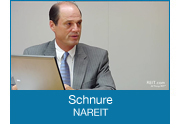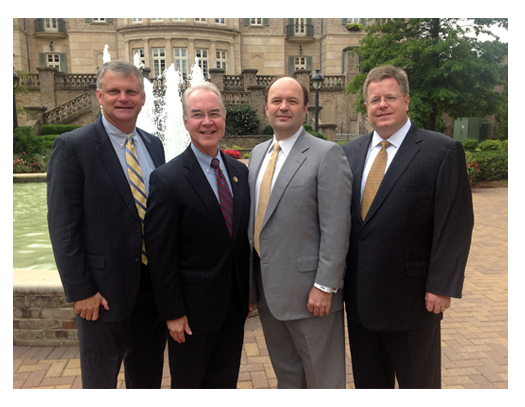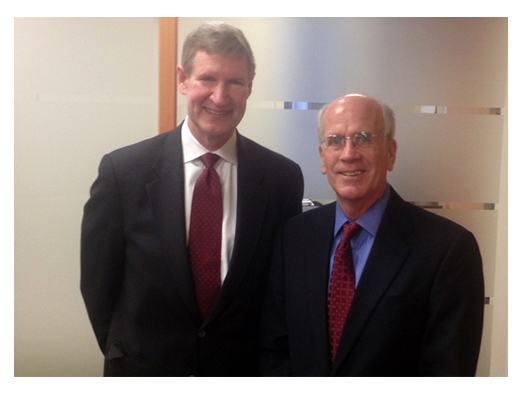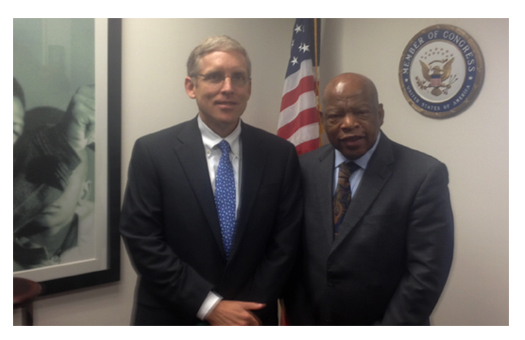|
October 15, 2012
Message from the President
 REITs were created by Congress in 1960 as a way to provide easy and effective access to investment in real estate a way for the average person to invest in large-scale, income-producing real estate he or she wouldn't otherwise be able to acquire or afford. REITs were created by Congress in 1960 as a way to provide easy and effective access to investment in real estate a way for the average person to invest in large-scale, income-producing real estate he or she wouldn't otherwise be able to acquire or afford.
From its beginning, the REIT approach to real estate investment as established by Congress contemplated land and improvements to it. Congress used this approach because it understood then that the role and uses of real estate in the economy would change over time.
Consequently, there have been REITs in the past and there are REITs today that own real estate tied in some fashion to many, if not most, sectors of the economy. The holdings of these REITs take the form of apartments, shopping centers, warehouses, hotels, storage facilities, health care-related properties, offices, data centers and more.
Over the years, our industry would now and then see a publicly traded real estate company which made the decision to elect to be taxed as a REIT. In recent months, a number of publicly traded companies have announced they are actively considering conversion to REIT status. Not surprisingly, this has attracted some attention, and some of the news coverage of this development has been highly misleading, suggesting that the REIT industry's growth has been largely a product of conversions. The hard, cold facts indicate otherwise; most of our industry's growth over the years has come about through IPOs, secondary offerings, acquisitions and growth in asset values.
With respect to most of the companies exploring conversion today, the IRS has yet to rule on whether some or all of them are or will become eligible to be REITs, and it may well decide they are not. In addition, some of the companies may decide ultimately not to convert given the various REIT requirements and shareholder views. In the past, companies that have successfully converted to the world of REITs have demonstrated they fit well within the template of a company focused on providing or financing real estate, in conjunction with related services, to tenants and customers.
REITs have been a vital and evolving component in the American economy for more than five decades. NAREIT's role is to constantly work with Congress, the IRS and other stakeholders to ensure REITs continue to play that critical role and operate within the regime established by Congress and in effect today.

Steven A. Wechsler
President and CEO
Chamber of Commerce Asks FASB, IASB to Rededicate to Convergence Effort
 On Oct. 10, NAREIT joined other members of the U.S. Chamber of Commerce's Financial Instruments Reporting and Convergence Alliance (FIRCA) in submitting a letter to the Financial Accounting Standards Board (FASB) and the International Accounting Standards Board (IASB) requesting that they rededicate themselves to the convergence of global accounting standards. Additionally, FIRCA provided the boards with an updated set of its operating principles, which covers many aspects of the joint Financial Instruments project. On Oct. 10, NAREIT joined other members of the U.S. Chamber of Commerce's Financial Instruments Reporting and Convergence Alliance (FIRCA) in submitting a letter to the Financial Accounting Standards Board (FASB) and the International Accounting Standards Board (IASB) requesting that they rededicate themselves to the convergence of global accounting standards. Additionally, FIRCA provided the boards with an updated set of its operating principles, which covers many aspects of the joint Financial Instruments project.
FIRCA expressed concern about the potential failure of efforts to converge U.S. Generally Accepted Accounting Principles (GAAP) with International Financial Reporting Standards (IFRS). The group alluded to some of the language used in public meetings as evidence of a potential schism developing between the boards that would potentially prevent them from completing their convergence efforts. FIRCA noted that if the convergence project falls through, the difference in rules could create confusion and result in the restriction of domestic and capital formation, "causing negative ripples to wave across fragile economies around the world."
(Contact: Christopher Drula at cdrula@nareit.com)
Chilton Declares REITs Ready for Prime Time
 In a recent report entitled "Equity REITs are Ready for Institutional Prime Time," Chilton Capital Management advocates greater institutional investment in REITs. Noting that many institutional investors for years "have favored direct real estate investment in place of owning [listed] REIT securities," the Chilton report asserts that "such institutions would benefit by using [listed] REITs for a larger part of their strategic real estate allocation." In a recent report entitled "Equity REITs are Ready for Institutional Prime Time," Chilton Capital Management advocates greater institutional investment in REITs. Noting that many institutional investors for years "have favored direct real estate investment in place of owning [listed] REIT securities," the Chilton report asserts that "such institutions would benefit by using [listed] REITs for a larger part of their strategic real estate allocation."
Highlighting the favorable investment attributes of publicly traded equity REITs, including liquidity, high income, low cost and competitive long-term real estate returns, the authors of the report argue that "there is certainly a place for both [listed REITs and private real estate] in a diversified real estate portfolio."
Noting that the equity market cap of the REIT industry now exceeds $500 billion, representing nearly $1 trillion of assets, the authors conclude that "institutional investors can no longer ignore [listed REITs] for a portion of their real estate allocation in our view. At the very least, the component of a portfolio allocated to 'Core' should include a heavy weighting toward REITs due to the efficiency provided to investors in low fees and portfolios unmatched in quality."
(Contact: Michael Grupe at mgrupe@nareit.com)
REIT.com Video: Calvin Schnure, NAREIT
 The latest reports on the industrial sector have been "surprisingly positive," according to Calvin Schnure, NAREIT's vice president of research and industry information. He said the ISM Manufacturing Survey rose to 51.5 in the September reading, which indicates an expansion in industrial output. The uptick in the industrial sector was in contrast to the relatively weak macroeconomic news recently released. The latest reports on the industrial sector have been "surprisingly positive," according to Calvin Schnure, NAREIT's vice president of research and industry information. He said the ISM Manufacturing Survey rose to 51.5 in the September reading, which indicates an expansion in industrial output. The uptick in the industrial sector was in contrast to the relatively weak macroeconomic news recently released.
"We also saw the recent news on auto sales that rose to almost a 15 million unit annual rate, which is getting closer to the long term trend over the past 15 years prior to the crisis," he said.
Schnure said that the auto sales report was positive, but it should not be characterized as "strong," and doesn't necessarily suggest a lot of near-term improvement. However, he pointed out that the report does show the potential for further gains down the road based on pent-up demand.
"Auto sales have been running well below their replacement demand for the stock that's out there," he said. "The average ages of cars on the road are older now, and there are also fewer cars on the road. There's a pent-up demand that's going to be a strong force for the industrial sector."
(Contact: Calvin Schnure at cschnure@nareit.com)
Reaching out to Financial Intermediaries at Morningstar Event
 Earlier this month, NAREIT participated in the Morningstar ETF Invest Conference in Chicago. Participation in this conference is a component of NAREIT's Investor Outreach program focused on promoting REIT investment to the retail investor marketplace through financial intermediaries such as family wealth officers, registered investment advisors (RIAs) and financial planners. Financial intermediaries are an important demographic because they have significant influence over the $5.3 trillion assets in individual retirement accounts (IRAs) in the U.S., representing approximately 33 percent and the fastest growing segment of the overall $15 trillion retirement savings market. Earlier this month, NAREIT participated in the Morningstar ETF Invest Conference in Chicago. Participation in this conference is a component of NAREIT's Investor Outreach program focused on promoting REIT investment to the retail investor marketplace through financial intermediaries such as family wealth officers, registered investment advisors (RIAs) and financial planners. Financial intermediaries are an important demographic because they have significant influence over the $5.3 trillion assets in individual retirement accounts (IRAs) in the U.S., representing approximately 33 percent and the fastest growing segment of the overall $15 trillion retirement savings market.
The Morningstar ETF Conference caters to asset-management firms that create ETF strategies and to financial advisors who manage money on behalf of their clients. This year's event attracted approximately 400 attendees and provided NAREIT an opportunity to inform and educate the financial advisor and RIA attendees on the benefits of REIT investing. It also provided the opportunity to develop stronger relationships with many of the participating asset management firms and index providers with which NAREIT maintains a regular dialogue through its direct meeting program, including FTSE, iShares, Market Vectors ETFs, WisdomTree, and Schwab ETFs.
(Contact: Abby McCarthy at amccarthy@nareit.com)
Long-time NAREIT Member Stephen T. Ryan Dies
 Stephen T. Ryan, former co-chair of NAREIT's State and Local Tax Subcommittee and a frequent speaker at NAREIT's annual law and accounting conference, died suddenly on Oct. 8. Stephen T. Ryan, former co-chair of NAREIT's State and Local Tax Subcommittee and a frequent speaker at NAREIT's annual law and accounting conference, died suddenly on Oct. 8.
Ryan was an expert on the complexities of state taxation of REITs. He was a partner with Grant Thornton LLP and active nationally in the real estate, banking and financial sectors for more than 30 years. "His special knack for converting business relationships into personal friendships made him the first person many people called when they had a problem or good news," according to his colleagues at the firm.
He is survived by his wife, Mary Kay, and their three children, Michael, Colleen and Kathryn.
(Contact: Dara Bernstein at dbernstein@nareit.com)
Register Today for REITWorld 2012
 REITWorld 2012: NAREIT's Annual Convention for All Things REIT, scheduled for Nov. 13-15 in San Diego, provides a unique opportunity where REIT and real estate executives, experienced and sophisticated investors, industry leaders, and academic experts come together in one setting to share their specialized knowledge and experience. REITWorld 2012: NAREIT's Annual Convention for All Things REIT, scheduled for Nov. 13-15 in San Diego, provides a unique opportunity where REIT and real estate executives, experienced and sophisticated investors, industry leaders, and academic experts come together in one setting to share their specialized knowledge and experience.
This year, conference sessions will offer a unique view of four market segments: health care, housing, business-to-business real estate (including office, industrial, data center and infrastructure REITs) and consumer-oriented real estate (including hotels, regional malls, strip centers and self-storage REITs).
Attendees will gain understanding and insight into the opportunities, business models and economic drivers of these four sectors, as well as many of the individual companies within them.
Visit the REITWorld Event page to register and to get all the details regarding the event as they become available.
(Contact: Katelyn Rowland at krowland@nareit.com)
REITs in the Community

Oct. 9, 2012: Rep. Tom Price (R-GA), second from left, recently visited with executives from Piedmont Office Realty Trust (NYSE: PDM) and was updated on the company's current development projects in Georgia and throughout the country. Piedmont representatives pictured with Price are, from left to right: Don Miller, CEO; Robert Bowers, CFO; and Bo Reddic, executive vice president, real estate operations.

Oct. 8, 2012: David Henry, vice chairman, president and CEO of Kimco Realty Corp. (NYSE: KIM), hosted Rep. Peter Welch (D-VT) at Kimco's office in New York. Henry briefed the congressman on the history of Kimco and the challenges and opportunities facing owners of neighborhood and community shopping centers. The two also discussed the role that REITs have played in this and past economic recoveries, Welch's leadership in advocating for sales tax fairness between online and brick-and-mortar retailers and his efforts to modify federal tax incentives for energy-efficient buildings so that they could be useful for REITs.

Oct. 4, 2012: Larry Gellerstedt, president and CEO of Cousins Properties Inc. (NYSE: CUZ), left, met with Rep. John Lewis (D-GA), right. Gellerstedt briefed the congressman, who is a senior member of the House Ways and Means Committee, on Cousins Properties' investments in Atlanta and around the nation. Gellerstedt also highlighted the diversification and income generation benefits that REITs offer to investors from all walks of life.
(Contact: Kate Smith at ksmith@nareit.com)
NAREIT Welcomes New Member
 Recently, NAREIT welcomed Western Asset Mortgage Capital Corporation (NYSE: WMC) as its newest corporate member. Western Asset Mortgage Capital is a newly formed, externally managed mortgage REIT that focuses on agency residential mortgage-backed securities. Based in Pasadena, CA, the company's president and CEO is Gavin James. Recently, NAREIT welcomed Western Asset Mortgage Capital Corporation (NYSE: WMC) as its newest corporate member. Western Asset Mortgage Capital is a newly formed, externally managed mortgage REIT that focuses on agency residential mortgage-backed securities. Based in Pasadena, CA, the company's president and CEO is Gavin James.
(Contact: Bonnie Gottlieb at bgottlieb@nareit.com)
|

 REITs were created by Congress in 1960 as a way to provide easy and effective access to investment in real estate a way for the average person to invest in large-scale, income-producing real estate he or she wouldn't otherwise be able to acquire or afford.
REITs were created by Congress in 1960 as a way to provide easy and effective access to investment in real estate a way for the average person to invest in large-scale, income-producing real estate he or she wouldn't otherwise be able to acquire or afford.
 On Oct. 10, NAREIT joined other members of the U.S. Chamber of Commerce's Financial Instruments Reporting and Convergence Alliance (FIRCA) in submitting a
On Oct. 10, NAREIT joined other members of the U.S. Chamber of Commerce's Financial Instruments Reporting and Convergence Alliance (FIRCA) in submitting a 

 Earlier this month, NAREIT participated in the Morningstar ETF Invest Conference in Chicago. Participation in this conference is a component of NAREIT's Investor Outreach program focused on promoting REIT investment to the retail investor marketplace through financial intermediaries such as family wealth officers, registered investment advisors (RIAs) and financial planners. Financial intermediaries are an important demographic because they have significant influence over the $5.3 trillion assets in individual retirement accounts (IRAs) in the U.S., representing approximately 33 percent and the fastest growing segment of the overall $15 trillion retirement savings market.
Earlier this month, NAREIT participated in the Morningstar ETF Invest Conference in Chicago. Participation in this conference is a component of NAREIT's Investor Outreach program focused on promoting REIT investment to the retail investor marketplace through financial intermediaries such as family wealth officers, registered investment advisors (RIAs) and financial planners. Financial intermediaries are an important demographic because they have significant influence over the $5.3 trillion assets in individual retirement accounts (IRAs) in the U.S., representing approximately 33 percent and the fastest growing segment of the overall $15 trillion retirement savings market. Stephen T. Ryan, former co-chair of NAREIT's State and Local Tax Subcommittee and a frequent speaker at NAREIT's annual law and accounting conference, died suddenly on Oct. 8.
Stephen T. Ryan, former co-chair of NAREIT's State and Local Tax Subcommittee and a frequent speaker at NAREIT's annual law and accounting conference, died suddenly on Oct. 8.




